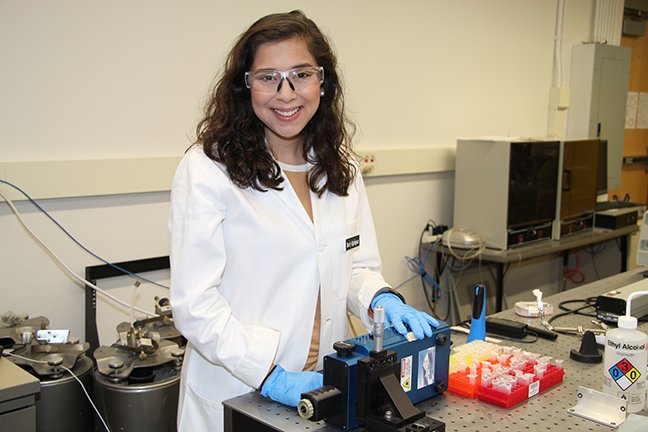Rebeca Rodriguez receives fellowships and awards

Rebeca Rodriguez is an outstanding graduate student and researcher earning prestigious and competitive fellowships and awards for her work, including a Doctoral Dissertation Fellowship, American Chemical Society Division of Analytical Chemistry Fellowship, Louis T. Dosdall Fellowship, and Women Chemists Committee Merck Research Award. She is a 5th-year graduate student working with Professor Christy Haynes.
The Doctoral Dissertation Fellowship gives the University's most accomplished doctorate candidates an opportunity to devote full-time effort to an outstanding research project by providing time to finalize and write a dissertation during the fellowship year. The Louis T. Dosdall Fellowship is awarded by the Graduate School to women graduate students in the natural or physical sciences and engineering who hold superior academic records and show professional promise. The Women Chemists Committee (WCC)/Merck Research Award recognizes research excellence.
Becky's research is at the interface of analytical, polymer, and materials chemistry. She is working to create inexpensive sensors for biological target detection. Using a polymer affinity agent, which is less specific than traditional affinity agents, provides the potential for multiplex detection, the ability to detect more than one target simultaneously.
She is currently working on multiplex detection of ochratoxin A and deoxynivalenol, two mycotoxins (toxins derived by fungi) that contaminate food and are deadly to humans. By pairing this work with a sensitive technique like surface-enhanced Raman spectroscopy (SERS), an attractive analytical technique due to its high enhancement factors and its ability to assign specific vibrational modes to certain molecules at very low concentrations, it is possible to monitor binding occurring between the affinity agent and two small molecules. SERS spectra provides “fingerprints” for the targets and when paired with computational modeling, helps confirm hypotheses on binding and target/polymer interaction.
Becky's research shows that by using density function theory modeling, it is possible to attribute changes in vibrational spectra to particular interactions between the target and polymer by monitoring computational vibrations in real time. This work demonstrates that optimization of SERS sensing to achieve limits of detection is comparable to current detection methods. However, it provides a simpler and more flexible signal transduction mechanism, opening opportunities for future applications in complex matrices where these toxins are traditionally found.
After earning her doctorate, Becky hopes to work for a government agency detecting chemical and biological warfare.